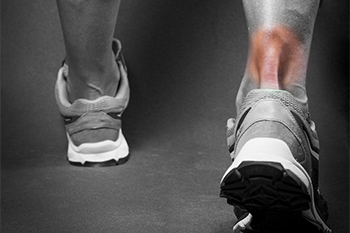Achilles Tendon Injuries and Healing

An Achilles tendon injury occurs when the tendon that connects the calf muscles to the heel becomes strained, inflamed, or torn. The Achilles tendon is a strong, fibrous band that plays a vital role in walking, running, and jumping. Injuries range from mild tendonitis, which causes pain and stiffness, to partial or complete tears that can severely limit movement. Symptoms include swelling, tenderness, sharp pain near the heel, and difficulty pushing off the foot. In some cases, minor injuries can heal without surgery through rest and strengthening exercises. The tendon gradually repairs itself by forming new collagen fibers. Proper footwear, controlled stretching, and avoiding excessive strain can support healing. Severe ruptures may require medical intervention, but early treatment improves the chances of a full recovery. If you have sustained an Achilles tendon injury, it is suggested that you promptly contact a chiropodist who can offer appropriate treatment solutions.
Achilles tendonitis is a common injury of the Achilles tendon, a band of fibrous tissue that runs along the back of the lower leg. The Achilles tendon can also rupture, making it impossible to lift the foot. If you are suffering from heel or calf pain, please consult with one of the chiropodists from The Footcare Centre. Our chiropodists can help you maintain the health of your lower limbs and your mobility.
Causes of Achilles tendon injuries include:
Repetitive stress or overuse
Sudden increase in activity levels
High impact injury
Calf muscle tightness or weakness
Altered foot biomechanics
Heel bone spurs
Underlying medical conditions that weaken the tendon
Symptoms of an Achilles tendon injury include:
Heel and calf pain that worsens following exercise
Chronic heel and calf pain
Sudden pain in the back of the ankle or calf
A popping or snapping sensation
Thickened lump in the Achilles tendon
Ankle and calf stiffness
Decreased range of motion in the affected foot
Swelling
Difficulty walking
Treatment
Resting the affected leg
Applying ice
Compressing the foot and ankle
Elevating the injured leg
Wearing orthotics
Low impact exercises
Stretches
Strengthening exercises
Non-steroidal anti-inflammatory medications
Cortisone injections
Surgery, if the tendon is ruptured
Achilles tendon injuries can be very painful and lead to reduced mobility if left untreated. If you have any questions, please feel free to contact our office located in . We offer the newest diagnostic and treatment technologies for all your foot care needs.
